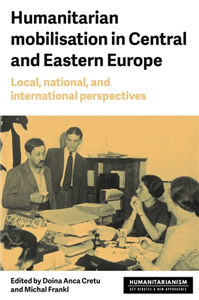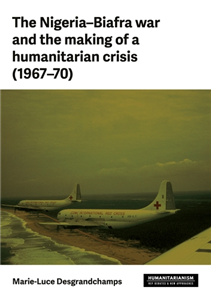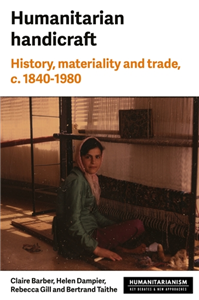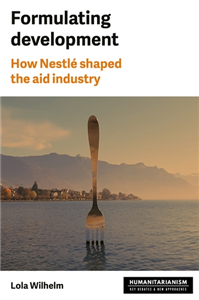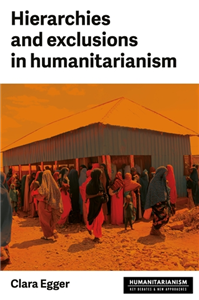Your Search Results
-
Organisation for Researching and Composing University Textbooks in the Humanities (SAMT)
Over 140 titles of books in cooperation with universities and research centers in countries in Asia and Europe
View Rights Portal
-
Promoted ContentHumanities & Social SciencesOctober 2022
France, humanitarian intervention and the responsibility to protect
by Eglantine Staunton
-
Promoted ContentHumanities & Social SciencesNovember 2025
Humanitarian mobilisation in Central and Eastern Europe
Local, national, and international perspectives
by Doina Anca Cretu, Michal Frankl
By focusing on aid Central and Eastern Europe, the volume adds to the existent scholarly explorations of modern humanitarianism, its actors and practices. In the twentieth century, aid workers assisted victims of war and earthquakes, delivered food, supported health care, provided childcare, or sheltered refugees. The contributors not only reconstruct these diverse histories and their protagonists, but also bring international, national, and local actors together: from grassroots activists to private associations to state-driven "socialist humanitarians" to large Western aid organizations. In doing so, they challenge the often unidirectional, from West-to-East, and asymmetrical perspective on donor-recipient relationships in humanitarian processes.
-
 Trusted Partner
Business, Economics & LawMarch 2026
Trusted Partner
Business, Economics & LawMarch 2026Humanitarianism in Civil War
The Biafra crisis, 1967-1970
by Marie-Luce Desgrandchamps
May 1967, in Nigeria, the Republic of Biafra declared its independence. Soon, civil war and famine ravaged the region and gradually entered the European and American media. Photographs of the conflict arouse considerable emotion in the West. The secessionist enclave and the areas taken over by the Nigerian army then became the scene of major relief operations, developed and financed by multiple organizations and governments. Part of a historiography of humanitarianism in full renewal, this book tells the story of the war, its metamorphosis into an international crisis and the responses that were provided. Based on a large body of sources from French, British, Swiss, Nigerian and American archives, it offers an insight into the world of humanitarian work at the end of the 1960s. It shows the reconfigurations taking place there. in the postcolonial era by proposing complementary scales of observation - international, national and local. The work also revisits some of the controversies which developed around the conflict regarding the instrumentalization of aid, its links with politics, the reception of relief operations on the ground or even the birth of borderlessness and testimony. It thus returns to the place occupied by the Biafran crisis in the history of humanitarian aid.
-
 Trusted Partner
Trusted Partner
-
 Trusted Partner
Humanities & Social SciencesSeptember 2025
Trusted Partner
Humanities & Social SciencesSeptember 2025Humanitarian handicraft
History, materiality and trade, c. 1840–1980
by Rebecca Gill, Claire Barber, Helen Dampier, Bertrand Taithe
This book uncovers the overlooked history of artisanal textiles in projects aimed at social uplift and moral reform. The contributors ask what the implications of this form of gendered craft production are for our understanding of the humanitarian imagination, relations of humanitarian production and the generation of meaning and social and artistic value. It also opens a dialogue with contemporary socially-engaged textile artists to engender critical reflection on the socially-situated meaning of textile craft in past and present humanitarian contexts.
-
 Trusted Partner
Humanities & Social SciencesJune 2015
Trusted Partner
Humanities & Social SciencesJune 2015Humanitarian intervention in the long nineteenth century
by Alexis Heraclides, Ada Dialla
-
 Trusted Partner
Humanities & Social SciencesNovember 2018
Trusted Partner
Humanities & Social SciencesNovember 2018Humanitarian intervention in the long nineteenth century
by Alexis Heraclides, Bertrand Taithe, Ada Dialla
-
 Trusted Partner
Teaching, Language & ReferenceAugust 2024
Trusted Partner
Teaching, Language & ReferenceAugust 2024Aid to Armenia
Humanitarianism and intervention from the 1890s to the present
by Joanne Laycock, Francesca Piana
Interventions on behalf of Armenia and Armenians have come to be identified by scholars and practitioners alike as defining moments in the history of humanitarianism. This book reassesses these claims, critically examining a range of interventions by governments, international and diasporic organizations, and individuals that aimed to 'save Armenians'. Drawing on multidisciplinary perspectives, it traces the evolution of these interventions from the late-nineteenth century to the present day, paying particular attention to the aftermaths of the genocide and the upheavals of the post-Soviet period. The contributions connect diverse places (the Caucasus, Russia, the Middle East, Europe, North America, South America, and Australia) to reveal shifting transnational networks of aid and intervention. Aid to Armenia explores this history, and engages critically with contemporary humanitarian questions facing Armenia, the South Caucasus region and the wider diaspora.
-
 Trusted Partner
Humanities & Social SciencesDecember 2020
Trusted Partner
Humanities & Social SciencesDecember 2020The military-humanitarian complex in Afghanistan
by Bertrand Taithe, Eric James, Tim Jacoby
-
 Trusted Partner
African historyJanuary 2017
Trusted Partner
African historyJanuary 2017Humanitarian aid, genocide and mass killings
Médecins Sans Frontières, the Rwandan experience, 1982–97
by Jean-Hervé Bradol. Series edited by Bertrand Taithe
Throughout the 1990s, Médecins Sans Frontières (MSF) was forced to face the challenges posed by the genocide of Rwandan Tutsis and a succession of outbreaks of political violence in Rwanda and its neighbouring countries. Humanitarian workers were confronted with the execution of almost one million people, tens of thousands of casualties pouring into health centres, the flight of millions of people who had sought refuge in camps and a series of deadly epidemics. Drawing on various hitherto unpublished private and public archives, this book recounts the experiences of the MSF teams working in the field. It is intended for humanitarian aid practitioners, students, journalists and researchers with an interest in genocide and humanitarian studies and the political sociology of international organisations.
-
 Trusted Partner
Humanities & Social SciencesJune 2021
Trusted Partner
Humanities & Social SciencesJune 2021Acts of supremacy
by J. Bratton, Richard Cave, Brendan Gregory, Michael Pickering
Imperialist discourse interacted with regional and class discourses. Imperialism's incorporation of Welsh, Scots and Irish identities, was both necessary to its own success and one of its most powerful functions in terms of the control of British society. Most cultures have a place for the concept of heroism, and for the heroic figure in narrative fiction; stage heroes are part of the drama's definition of self, the exploration and understanding of personal identity. Theatrical and quasi-theatrical presentations, whether in music hall, clubroom, Shakespeare Memorial Theatre or the streets and ceremonial spaces of the capital, contributed to that much-discussed national mood. This book examines the theatre as the locus for nineteenth century discourses of power and the use of stereotype in productions of the Shakespearean history canon. It discusses the development of the working class and naval hero myth of Jack Tar, the portrayal of Ireland and the Irish, and the portrayal of British India on the spectacular exhibition stage. The racial implications of the ubiquitous black-face minstrelsy are focused upon. The ideology cluster which made up the imperial mindset had the capacity to re-arrange and re-interpret history and to influence the portrayal of the tragic or comic potential of personal dilemmas. Though the British may have prided themselves on having preceded America in the abolition of slavery and thus outpacing Brother Jonathan in humanitarian philanthropy, abnegation of hierarchisation and the acceptance of equality of status between black and white ethnic groups was not part of that achievement.
-
 Trusted Partner
Humanities & Social SciencesJuly 2016
Trusted Partner
Humanities & Social SciencesJuly 2016The humanitarian-military complex in Afghanistan
by Bertrand Taithe, Eric James, Tim Jacoby
Violent conflict brings together two seemingly disparate groups: humanitarians and soldiers. This mixes and convolutes agendas, blurring lines that are often perceived to be sacrosanct. Delving deeply into the history and reasons of why these two groups work in close proximity, this study provide a unique insight into the history, ethical dilemmas and policy conundrums when aid workers operate close to the military. Using Afghanistan as a case study, analytical rigour, deep primary research and "field" knowledge are combined in an exceptional contribution to this important area. This book gives scholars and practitioners alike a nuanced perspective on the challenges faced by aid workers, military personnel and decision-makers alike in countries affected by violent conflicts, hosting foreign military interventions and receiving international aid. ;
-
 Trusted Partner
Humanities & Social SciencesJuly 2025
Trusted Partner
Humanities & Social SciencesJuly 2025Formulating development
How Nestlé shaped the aid industry
by Lola Wilhelm
In the 1970s, Nestlé became a lightning rod for criticism against the food industry's negative impacts on humans and their environment, especially in the Global South. But what has so far eluded historical scrutiny is that the picture was more nuanced. This book tells the exclusive story of how the Swiss food giant, and more broadly corporate capitalism, have shaped the aid industry since the late nineteenth century. It follows Nestlé's bid for a share of the humanitarian market brokered by the Red Cross in wartime Europe, of its clinical trials in Swiss and Senegalese maternities, and of its agricultural modernisation schemes in Mexico, India, and the Ivory Coast. Based on extensive research in the firm's own historical archives and the records of national and international aid agencies, the volume interrogates the legacies of this long history for international development today.
-
 Trusted Partner
Humanities & Social SciencesMay 2008
Trusted Partner
Humanities & Social SciencesMay 2008Intervention and state-building in the Pacific
The legitimacy of 'cooperative intervention'
by Peter Lawler, Greg Fry, Tarcisius Kabutaulaka, Emmanuel Pierre Guittet, Alan Rutter
State-building intervention in weak, war-torn or failing states has become a priority for the international community. However, the question of how to legitimately engage in the shaping of national governance remains, at the very least, a vexed one. This book explores this key issue through a critical examination of a new model of state-building intervention which has recently emerged in relation to the Pacific 'arc of crisis'. Initiated by the Australian Government in 2003, this 'cooperative intervention' doctrine, built on declared principles of partnership and respect for sovereignty, seems to offer a legitimate way to engage in state-building intervention. Drawing on a group of distinguished Pacific specialists, this book mounts a critique of these claims, showing how international legitimacy does not automatically translate into political legitimacy among those in the affected societies; and how the attempt to legitimise the intervention internationally may actually work against such legitimacy in the recipient state. These insights will be of value to those interested in public policy studies, international law, development studies and international relations. ;
-
 Trusted Partner
October 2022
Trusted Partner
October 2022From Dream to Trauma: Mental abuse in partnerships
by Caroline Wenzel
The level of domestic abuse has been increasing for years, but often only cases of physical abuse hit the headlines. Hardly anyone talks about the mental, or psychological, abuse that usually precedes a physical or sexual assault. Those affected do not usually recognise the destructive dynamic in their relationship until far too late. In this book, three case histories illustrate the typical forms of mental abuse in relationships. In addition, experts explain the topic from psychological, therapeutic, political and legal perspectives, and the head of a counselling centre for male victims of mental abuse also has his say. An important and startling book.
-
 Trusted Partner
Humanities & Social SciencesOctober 2024
Trusted Partner
Humanities & Social SciencesOctober 2024Humanitarianism, empire and transnationalism, 1760-1995
Selective humanity in the Anglophone world
by Joy Damousi, Trevor Burnard, Alan Lester
This is the first book to examine the shifting relationship between humanitarianism and the expansion, consolidation and postcolonial transformation of the Anglophone world across three centuries, from the antislavery campaign of the late eighteenth century to the role of NGOs balancing humanitarianism and human rights in the late twentieth century. Contributors explore the trade-offs between humane concern and the altered context of colonial and postcolonial realpolitik. They also showcase an array of methodologies and sources with which to explore the relationship between humanitarianism and colonialism. These range from the biography of material objects to interviews as well as more conventional archival enquiry. They also include work with and for Indigenous people whose family histories have been defined in large part by 'humanitarian' interventions.
-
 Trusted Partner
Psychology
Trusted Partner
PsychologyHarm Reduction Treatment for Substance Use
by Susan E. Collins / Seema L. Clifasefi
Concrete guidance on harm reduction treatment (HaRT) with substance-using patients:• Written by experts from the field• Details a unique evidence-based approach• Includes example scripts• Provides case studies• Includes downloadable handouts Harm reduction approaches are effective alternatives to abstinence-based treatment for people who are not ready, willing, or able to stop using substances. This volume outlines the scientific basis and historical development of these approaches, and reviews why abstinence-based approaches often do not work. The authors then share their expertise about harm reduction treatment (HaRT), an empirically based approach co-developed with community members impacted by substance-related harm – a first of its kind. The reader learns in detail about the pragmatic mindset and compassionate heartset of HaRT and the three treatment components: measurement and tracking of patient-preferred substance-related metrics, harm-reduction goal setting and achievement, and discussion of safer-use strategies. In addition, the book provides example scripts for use in daily practice.
-
 Trusted Partner
Business, Economics & LawMay 2025
Trusted Partner
Business, Economics & LawMay 2025Hierarchies and exclusion in humanitarianism
by Clara Egger, Andrea Schneiker
While humanitarians generally present themselves as 'do-gooders' and use this image to gather support and funding, this edited volume addresses hierarchies and exclusions in humanitarianism - an issue that has gained increased attention. Contributions analyse how hierarchies, power asymmetries and exclusion emerge, are maintained and can ultimately be challenged in humanitarian governance. Leading scholars on humanitarianism coming from a variety of disciplinary fields such as international relations, philosophy, organisational science and management, and sociology analyse exclusion dynamics at the individual, organisational and structural levels. Authors thereby combine data from a diverse range of methods, including ethnography, survey and statistical analysis. The volume informs current efforts to increase inclusiveness and equity in humanitarian practice.
-
 Trusted Partner
Humanities & Social SciencesAugust 2012
Trusted Partner
Humanities & Social SciencesAugust 2012Justifying violence
Communicative ethics and the use of force in Kosovo
by Naomi Head, Peter Lawler, Emmanuel Pierre Guittet
When is the use of force for humanitarian purposes legitimate? The book examines this question through one of the most controversial examples of humanitarian intervention in the post Cold War period: the 1999 NATO intervention in Kosovo. Justifying Violence applies a critical theoretical approach to an interrogation of the communicative practices which underpin claims to legitimacy for the use of force by actors in international politics. Drawing on the theory of communicative ethics, the book develops an innovative conceptual framework which contributes a critical communicative dimension to the question of legitimacy that extends beyond the moral and legal approaches so often applied to the intervention in Kosovo. The empirical application of communicative ethics offers a provocative and nuanced account which contests conventional interpretations of the legitimacy of NATO's intervention. ;
-
 Trusted Partner
Trusted Partner





